Harnessing your focus: essential management tools for adults with ADHD
By Remy Meraz • March 7, 2023
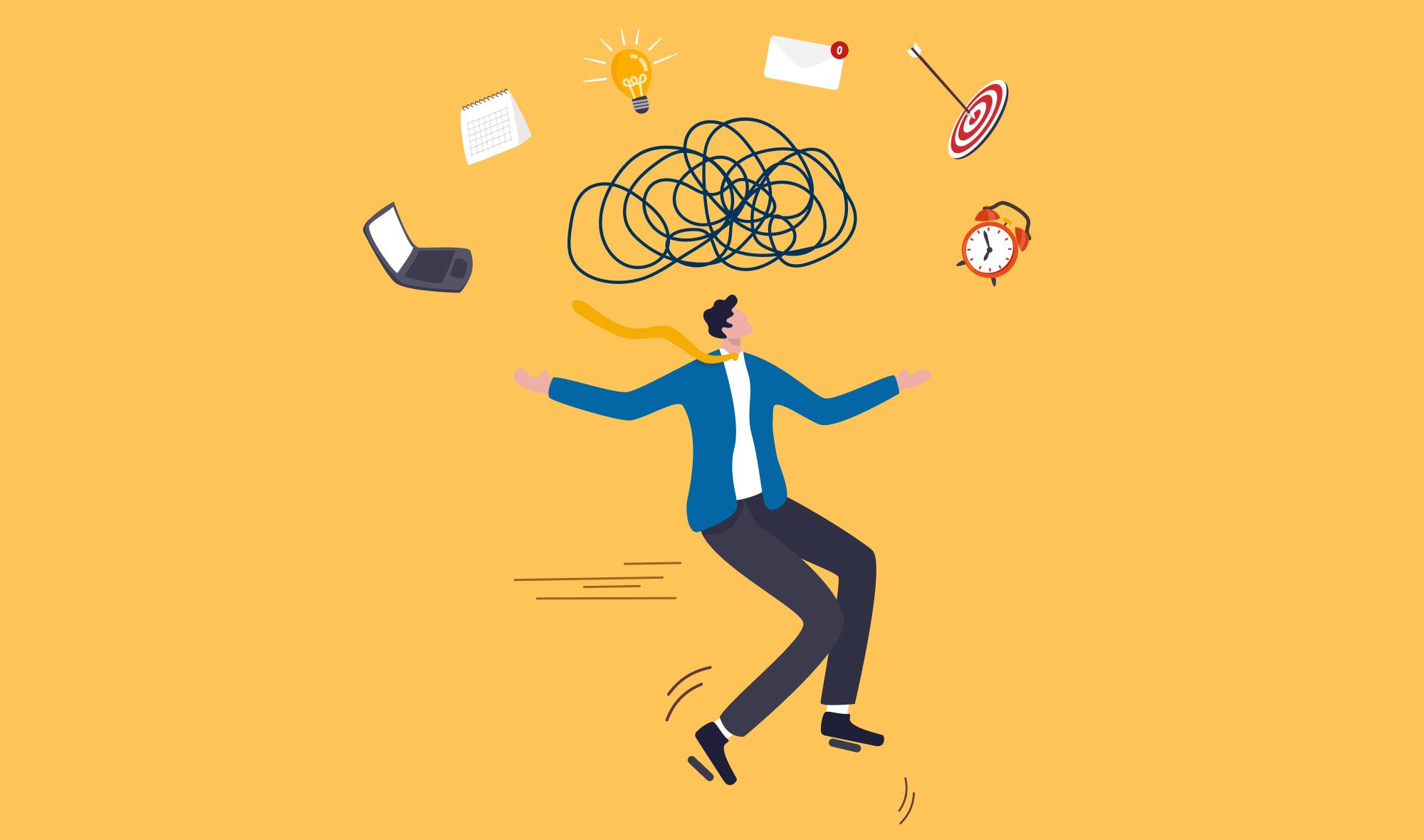
Attention Deficit Hyperactivity Disorder (ADHD) is a neurological condition that affects millions of Americans, both children and adults alike. In recent years, there has been a significant increase in the number of adults diagnosed with ADHD, with estimates suggesting that as many as 10 million Americans are currently living with the condition.
Despite this, there is still a pervasive lack of understanding and awareness surrounding the unique challenges faced by people with ADHD, particularly in their personal and professional lives. ADHD can have a profound impact on an individual's ability to focus, organize and manage their time effectively. This can lead to a range of difficulties in both personal and professional settings, such as missed deadlines, forgetfulness, difficulty completing tasks, and trouble maintaining relationships.
However, with the right strategies in place, any person with an ADHD diagnosis can learn to harness their concentration and manage their symptoms effectively. In this blog post, we will explore proper management tools for adult ADHD that can help improve their lives at work and at home. From time management techniques to mindfulness practices to developing a strong support system, we'll delve into the most effective strategies for staying focused, organized, and on track.
Whether you're someone living with ADHD or you're supporting someone who is, this post will provide valuable insights into how to navigate the unique challenges of living with this condition.
What is attention deficit hyperactivity disorder?
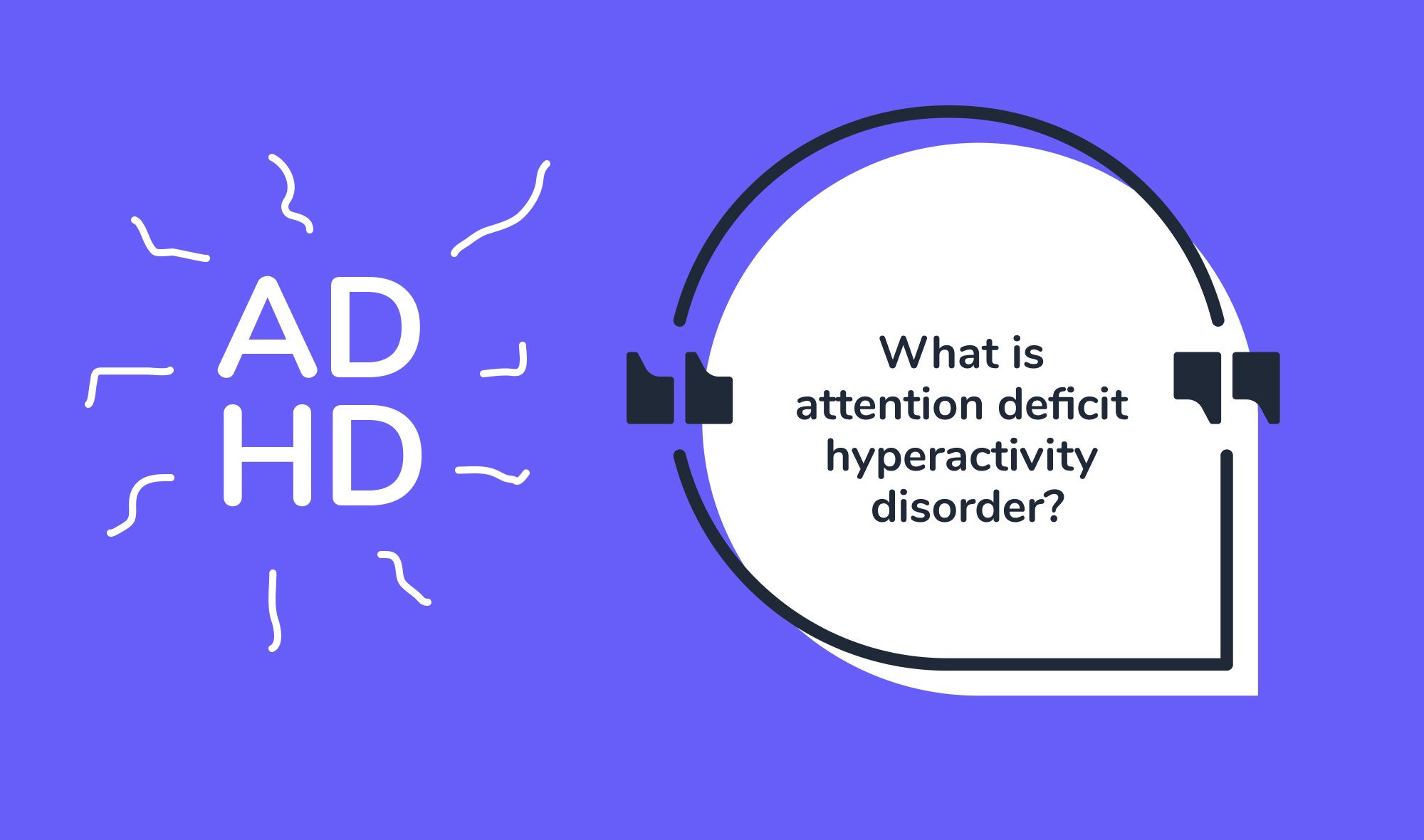
Attention Deficit Hyperactivity Disorder, or ADHD, is a neurodevelopmental condition that affects an individual's ability to concentrate, control impulses, and regulate their behavior. It is typically diagnosed in childhood, but it can also persist into adulthood.
The history of ADHD can be traced back to the late 1700s when doctors first described the idea of hyperactivity and inattention in children. In the early 1900s, a British pediatrician named George Still published a series of papers that described children who were highly impulsive, lacked attention, and struggled to finish tasks at school. He called this condition a "defect of moral control" and suggested that it was related to genetics.
Over the next few decades, researchers continued to study this condition, and it was given various names such as "minimal brain dysfunction" and "hyperkinetic reaction of childhood." However, it wasn't until the 1960s that doctors began to recognize and diagnose ADHD as a formal medical condition.
In 1968, the American Psychiatric Association (APA) officially recognized the condition and included it in the second edition of the Diagnostic and Statistical Manual of Mental Disorders (DSM-II). The DSM-II listed the condition as a "hyperkinetic reaction of childhood" and described it as a behavioral disorder that included symptoms of hyperactivity, impulsivity, and inattention.
In 1980, the third edition of the DSM (DSM-III) included the term "Attention Deficit Disorder (ADD)" for the first time. This was later expanded to "Attention Deficit Hyperactivity Disorder (ADHD)" in the DSM-III-R in 1987. The criteria for the diagnosis of ADHD have evolved over time, with the latest edition, DSM-5, including three subtypes: predominantly inattentive, predominantly hyperactive-impulsive, and combined.
Inattentive type
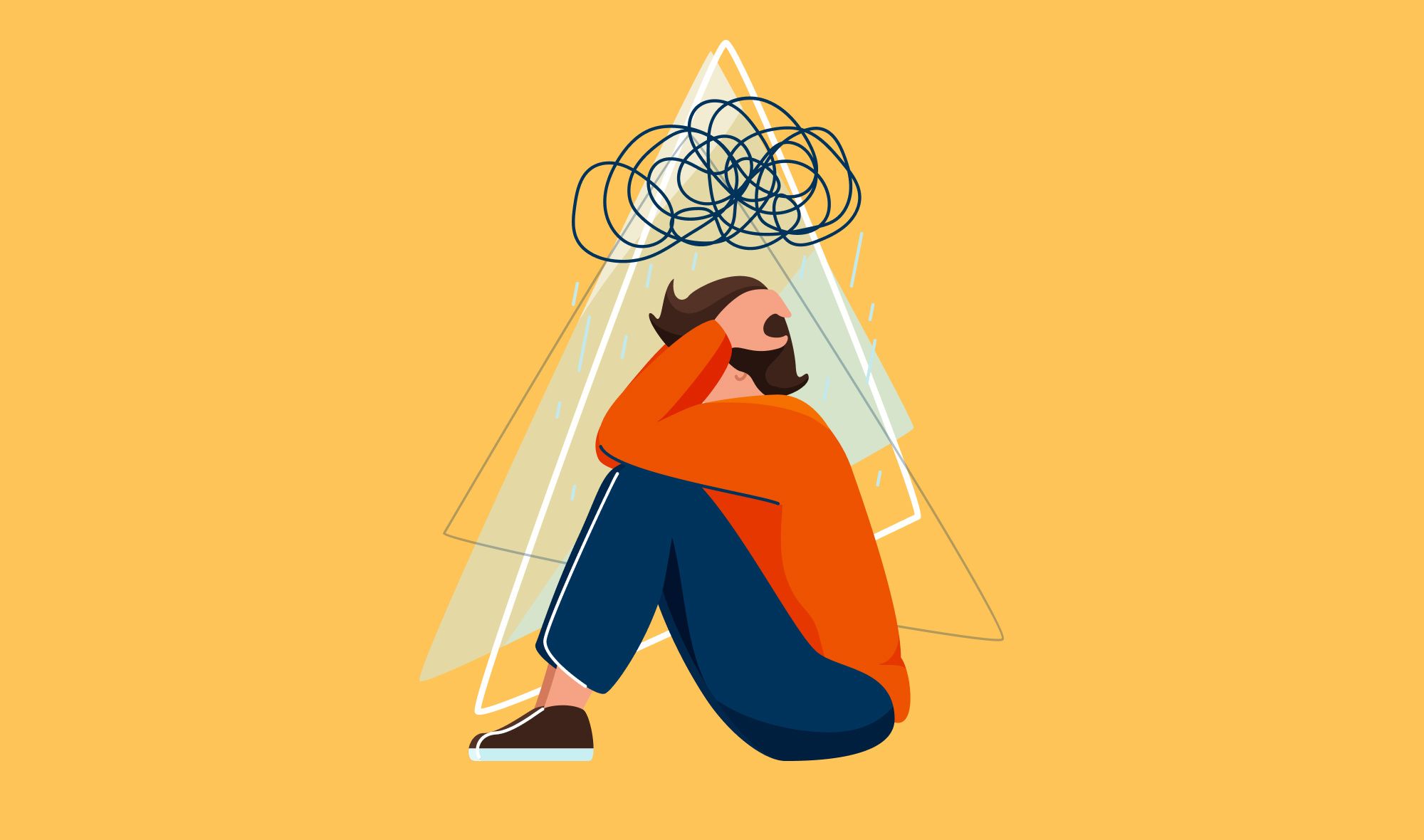
Individuals with the inattentive type of ADHD may experience difficulties with sustaining attention, forgetfulness and being easily distracted. These symptoms can significantly impact their ability to zone in on tasks, complete projects, and follow through on directions, among other things.
One of the hallmark symptoms of inattentive ADHD is difficulty sustaining attention. Individuals with this subtype may struggle to concentrate on tasks that are not stimulating or that require sustained effort. They may also have trouble filtering out distractions and may be easily pulled away from their work by external stimuli, such as noises or movements.
In addition to problems with attention, individuals with inattentive ADHD may also struggle with task organization and completion. They may have difficulty prioritizing tasks, breaking them down into manageable steps, and initiating and completing projects. As a result, they may struggle to meet deadlines or achieve their goals.
Hyperactive-impulsive type
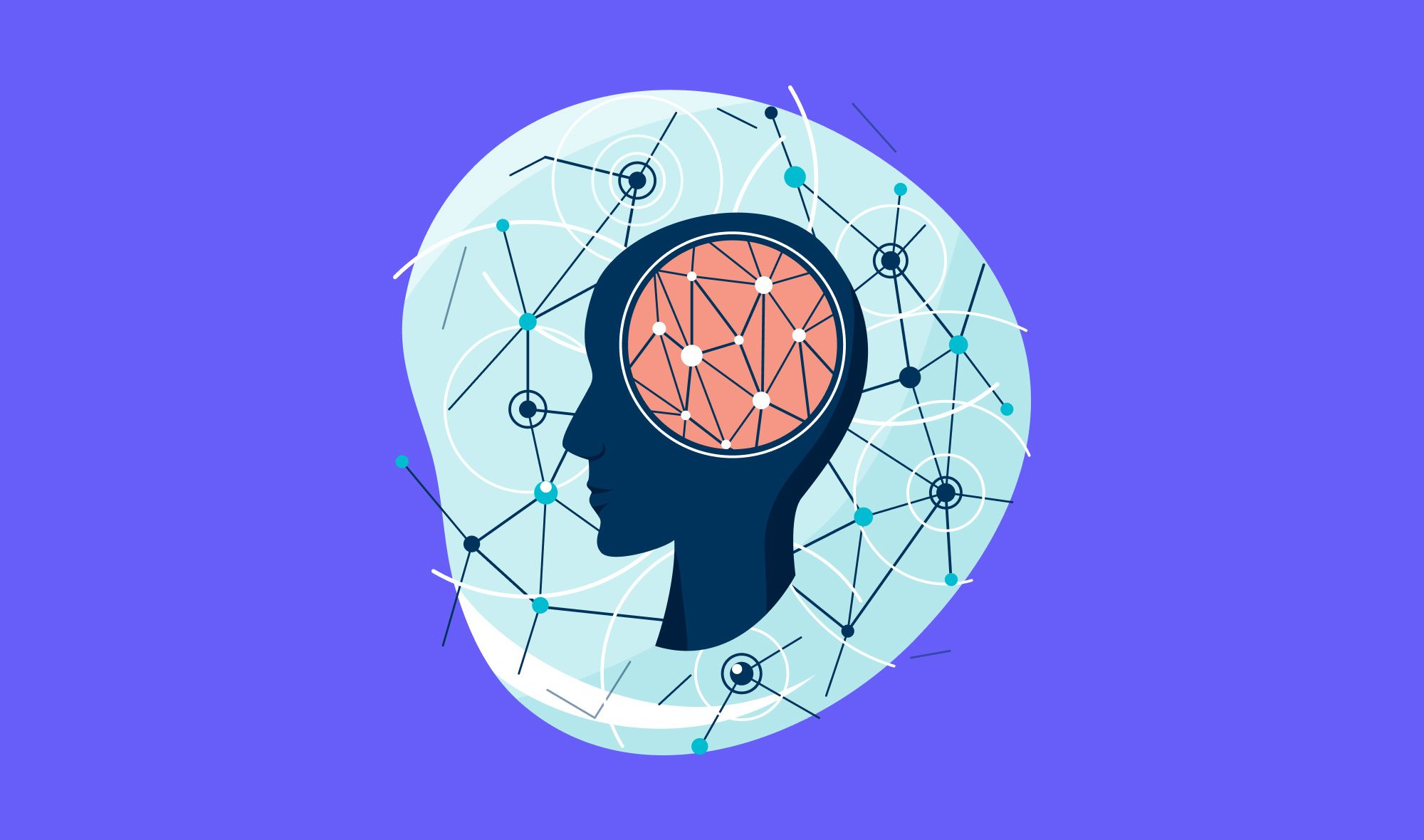
People with the hyperactive-impulsive subtype of ADHD have symptoms of hyperactivity and impulsivity, which can significantly impact their daily life.
Hyperactivity refers to excessive motor activity, which can manifest as fidgeting, squirming, or restlessness. Individuals with this subtype may have difficulty sitting still, especially in situations that require sustained attention, such as school or work. They may also be seen as "on the go" or "driven by a motor," as they are constantly moving and engaging in physical activity.
Impulsivity refers to acting without thinking, often leading to problems with self-control and decision-making. Individuals with this subtype may struggle with interrupting others, blurting out inappropriate comments, or acting on a whim without considering the consequences. They may also have difficulty waiting their turn and may be prone to cutting in line or speaking out of turn.
In addition to these hallmark symptoms, individuals with the hyperactive-impulsive subtype may also struggle with other executive functions, such as planning, organization, and time management. They may have difficulty completing tasks that require sustained effort, such as homework or household chores, and may struggle to meet deadlines.
Combined type
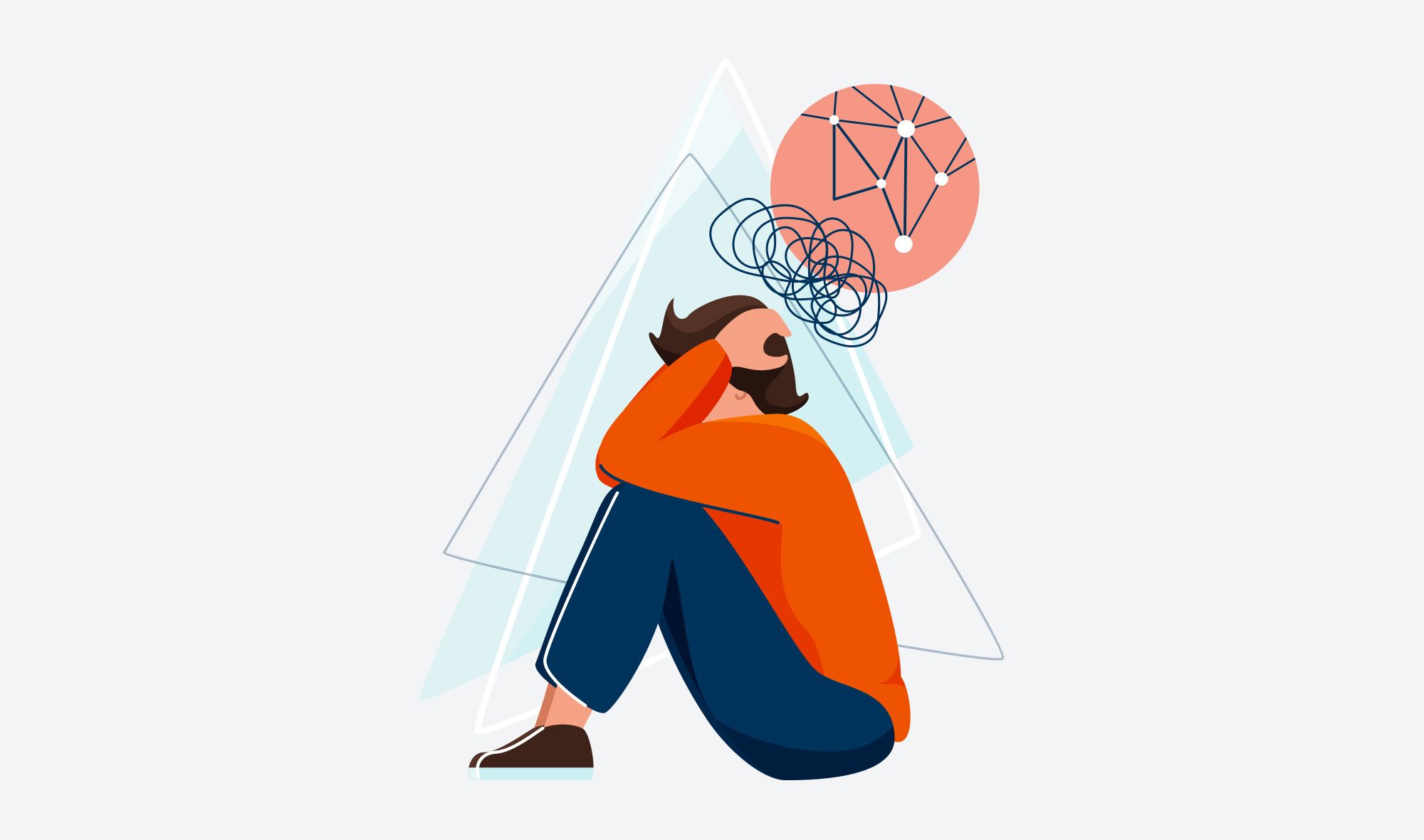
The combined type of ADHD is the most common subtype, and it is characterized by a combination of inattention, hyperactivity, and impulsivity. Individuals with the combined subtype may struggle with attention and focus, often finding it difficult to concentrate on tasks or sustain attention for extended periods.
They may also experience hyperactivity and impulsivity, leading to restlessness, fidgeting, and acting without thinking. They may also have trouble controlling their impulses, interrupting others, and waiting their turn.
How is ADHD different from other disorders?
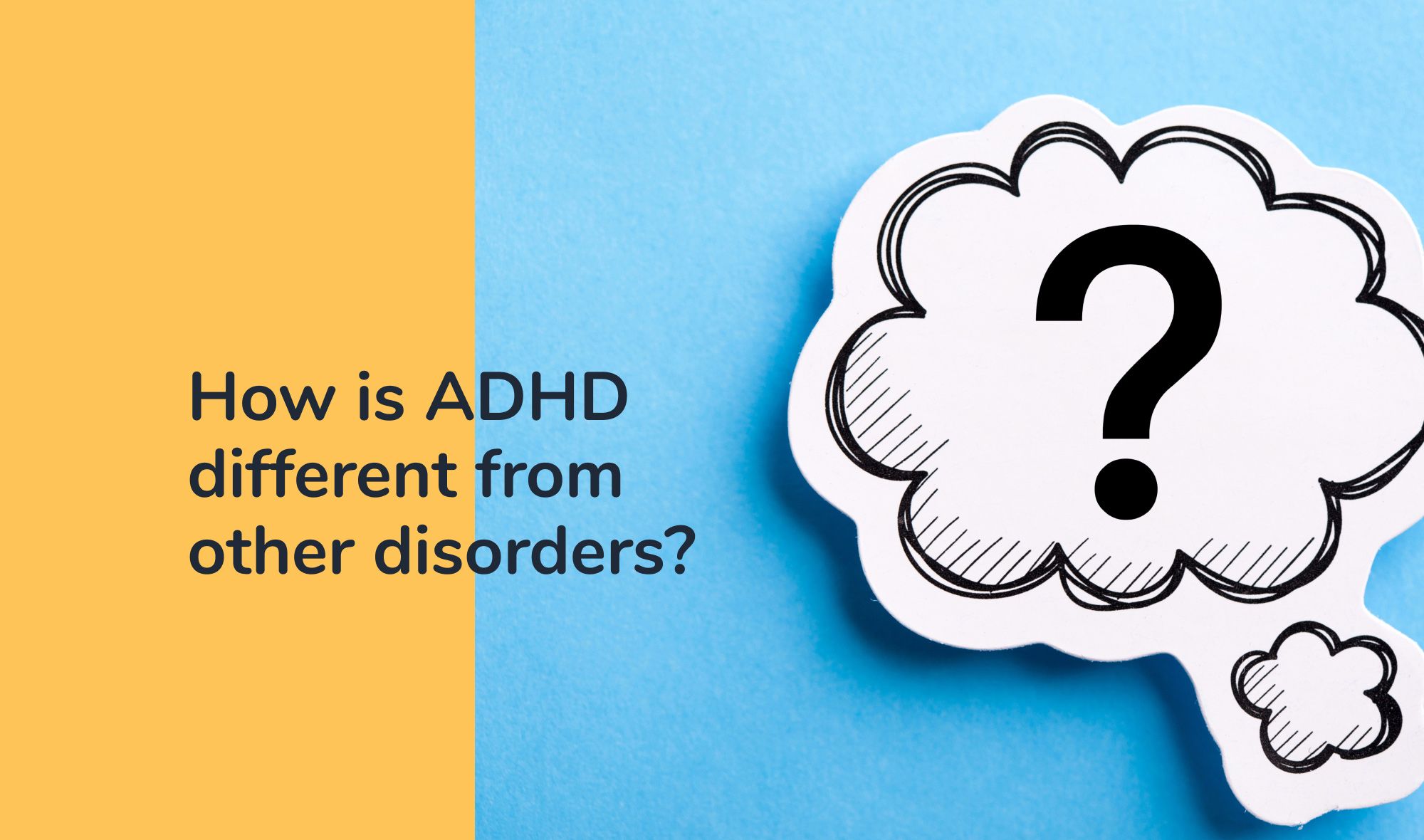
While ADHD is not the same thing as anxiety or mood disorders, research and peer-reviewed studies have shown that there is a strong relationship between them.
Anxiety disorders are a group of mental health conditions that involve excessive fear, worry, or apprehension. People with ADHD are more likely to experience anxiety disorders than the general population. This may be because the symptoms of ADHD can lead to a sense of overwhelm, frustration, and social difficulty that can trigger anxiety. For example, people with ADHD may feel anxious about forgetting something important, making mistakes, or being criticized by others.
Similarly, mood disorders such as depression and bipolar disorder are also commonly experienced by individuals with ADHD. This is likely because the symptoms of ADHD can lead to a sense of low self-esteem, feelings of inadequacy, and difficulty with goal-directed behavior, all of which can increase the risk of other mood disorders.
The relationship between ADHD and anxiety/mood disorders is complex and multifaceted, and it is not fully understood. However, it is clear that while there are similarities between these conditions, they are not the same thing. Therefore, while they may co-occur, it is important to recognize the unique features of each condition and to tailor treatment approaches accordingly.
Explanation of ADHD symptoms
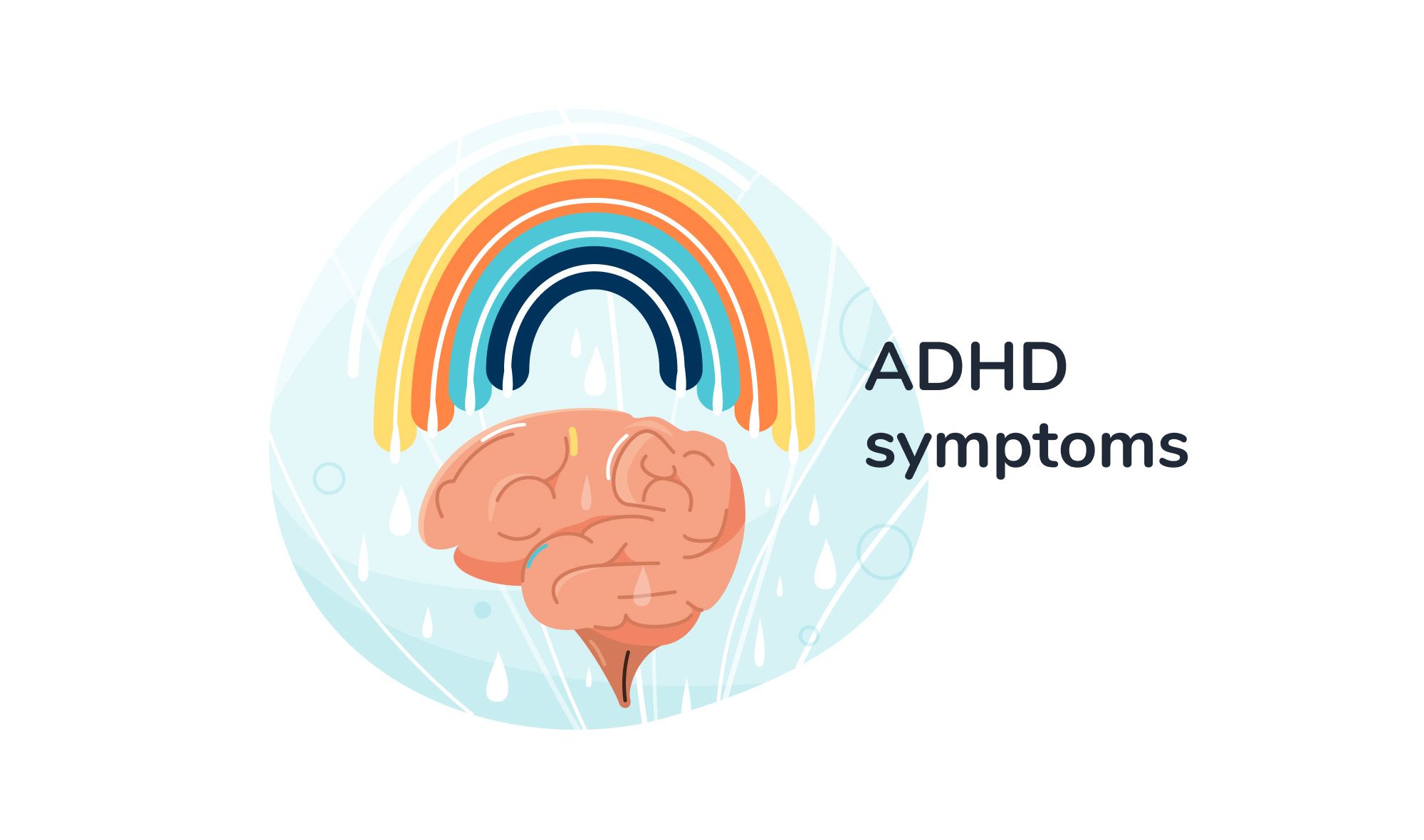
Adult ADHD symptoms differ in their presentation and severity, but they generally fall into three categories: inattention, hyperactivity, and impulsivity. Individuals with ADHD may exhibit symptoms from one or more of these categories.
The specific symptoms of ADHD can also change over time and may be influenced by other factors such as stress, sleep, physical activity, or even neuropsychological limits. For example, adults with learning disabilities may experience more difficulty with executive functioning as a result of their ADHD compared to those who do not.
Inattention symptoms include:
- Difficulty paying attention to details, making careless mistakes, and not being able to complete tasks.
- Lacking motivation and experiencing trouble focusing on important tasks or activities, even those that are enjoyable.
- Frequently losing or misplacing items such as keys, phones, or paperwork.
- Struggling to follow instructions, organize tasks, or meet deadlines.
- Frequently forgetting appointments, events, or obligations.
Hyperactivity symptoms include:
- Excessive movement or restlessness, such as fidgeting, squirming or tapping.
- Difficulty sitting still or remaining seated for long periods of time.
- Trouble engaging in quiet activities, such as reading or working at a desk.
- Running or climbing excessively, even in inappropriate situations.
- Talking excessively or interrupting others.
Impulsivity symptoms include:
- Acting without thinking, such as blurting out answers or interrupting conversations.
- Engaging in risky behavior, such as substance abuse, gambling, or unsafe sex.
- Trouble waiting for one's turn in conversation or in games.
- Difficulty delaying gratification, such as spending money impulsively or eating unhealthy foods.
It's important to note that many people experience some of these symptoms from time to time, but individuals with ADHD tend to experience them more frequently and in a way that significantly impacts their daily life. If you think you or someone you know may have untreated ADHD, it's worth talking to a qualified healthcare provider and seeking a comprehensive evaluation.
How do grown-ups cope with an ADHD diagnosis?

The diagnosis of ADHD typically involves a comprehensive evaluation, including a review of medical history, observation of symptoms, and assessments of attention, impulsivity, and hyperactivity. Effective treatment for ADHD often involves a combination of medication, therapy, and behavioral interventions, and may vary depending on the individual's unique situation and needs.
Medication:
Stimulant medications, such as Ritalin and Adderall, are the most commonly prescribed medications for the treatment of adult ADHD. These medications work by increasing the levels of dopamine and norepinephrine in the brain, which are neurotransmitters that play a key role in regulating attention and impulse control.
In adults with ADHD, stimulant medications can help improve focus and reduce impulsivity, allowing them to better manage their symptoms and engage more effectively in daily activities. Studies have shown that these medications can improve attention, minimize hyperactivity, and improve cognitive functioning. They can also help alleviate symptoms of depression and anxiety that often accompany ADHD.
While stimulant medications can be effective in treating adult ADHD, they are not a cure, and they may not work for everyone. Some individuals may experience negative consequences or side effects, such as insomnia, loss of appetite, or increased heart rate. Additionally, these medications can be habit-forming and should be used only under the supervision of a qualified healthcare provider.
Support from a mental health professional:
Cognitive-behavioral therapy (CBT) and other forms of therapy can be highly effective in helping people with ADHD learn coping strategies, manage symptoms, and improve their overall well-being. These therapies are centered around identifying and changing negative thought patterns and behaviors that can contribute to ADHD symptoms.
CBT is a structured, goal-oriented form of therapy that helps individuals with ADHD develop practical skills and strategies for managing their symptoms. This can include techniques for improving concentration, increasing organization and time awareness, and reducing impulsivity. CBT can also help individuals with ADHD develop coping strategies for managing stress and improving their mood.
Other forms of therapy that may be helpful for adults with ADHD include mindfulness-based therapies, such as mindfulness-based stress reduction (MBSR), which can help individuals improve attention and reduce stress. Acceptance and commitment therapy (ACT) can also be effective in helping individuals with ADHD learn to accept their symptoms and develop strategies for working with them, rather than against them.
Group therapy can also be a valuable resource for individuals with ADHD. This setting provides a supportive environment where individuals can share their experiences and learn from others who are facing similar challenges.
Lifestyle changes:
Making changes to diet, exercise, sleep, and stress management can be a valuable part of a comprehensive treatment plan for any person with ADHD. While these lifestyle modifications may not cure ADHD, they can help lessen the impact of the condition and other mental health conditions and improve overall well-being.
Diet: There is some evidence to suggest that certain dietary changes may be helpful in managing ADHD symptoms. Some studies have found that eliminating food additives and preservatives from the diet, such as artificial colors and flavors, may reduce hyperactivity and impulsivity in children with ADHD. Additionally, a balanced diet that includes plenty of fruits, vegetables, whole grains, and lean protein can help support overall health and well-being.
Exercise: Regular physical activity can be highly beneficial for individuals with ADHD. Exercise can help improve focus, reduce hyperactivity, and improve mood. It can also help improve overall health and well-being. Activities such as aerobic exercise, yoga, and martial arts have been shown to be particularly effective in reducing ADHD symptoms.
Sleep: Getting enough sleep is important for individuals with ADHD, as sleep deprivation can exacerbate symptoms. Establishing a regular sleep schedule and creating a relaxing bedtime routine can help improve sleep quality. Additionally, avoiding screens for at least an hour before bed and creating a dark, quiet sleeping environment can also be helpful.
Stress management: Stress can exacerbate ADHD symptoms, so developing effective stress management strategies is important for individuals with ADHD. This can include techniques such as deep breathing, meditation, and mindfulness. It can also include activities such as spending time in nature, engaging in hobbies, and socializing with supportive friends and family members.
5 key management tools for adults with ADHD
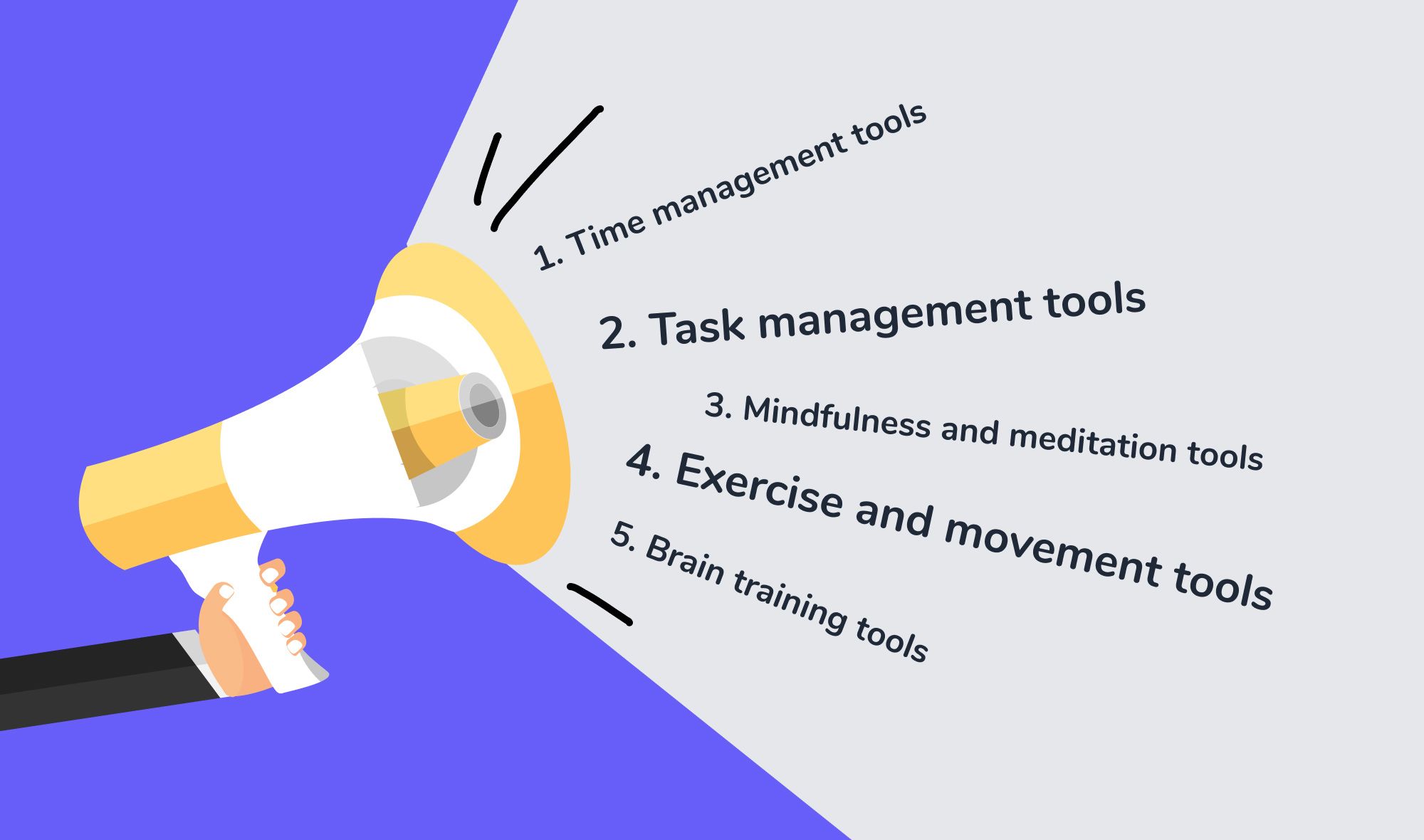
ADHD is often challenging to manage, as it involves a wide range of symptoms that can vary in severity and impact and can affect many different areas of life, such as school, work, or social interactions. This can lead to poor academic or work performance, trouble with relationships, and feelings of frustration, angst, or low self-esteem.
Fortunately, there are several management tools that can help people with ADHD manage their symptoms effectively. Let's dig into five key management tools that can assist people with ADHD and help them improve their daily life. Read on to learn more.
1. Time management tools
Time management is crucial for adults with ADHD as they often struggle with planning, prioritization, and time estimation. Effective time management helps to improve productivity and reduce stress.
To-do lists, calendars, and timers can be helpful time management tools. To-do lists can be created daily or weekly and should prioritize items in order of importance. Calendars can be used to schedule appointments, deadlines, and other time-sensitive events. Timers can be used to break down tasks into manageable chunks of time, allowing for better focus and motivation.
The Pomodoro technique can also be a helpful tool for managing inattention and impulsivity. Setting a time limit for productivity and taking frequent breaks can help individuals with ADHD break down tasks into manageable segments, stay on task, and avoid distractions.
Additionally, this technique can help individuals with ADHD develop a sense of accomplishment and satisfaction by completing tasks within each interval. This can be especially beneficial for those with ADHD who may struggle with starting and finishing projects due to a lack of motivation or easily becoming overwhelmed.
2. Task management tools
People struggling with ADHD often have trouble staying organized and avoiding distractions, making task management an essential tool for success. Task managers, project management software, and note-taking apps can be helpful task management tools. Task managers allow users to create tasks, set deadlines, and assign priorities. Project management software can be used to break down complex projects into manageable tasks. Note-taking apps can be used to capture ideas, reminders, and other important information.
These task management tools help with staying focused and avoiding distractions by breaking down tasks and keeping users accountable. They help with prioritization and planning by allowing users to organize and track their progress on specific projects or tasks.
Join our Newsletter
Transform your career with our personal growth insights. Get one valuable tip right in your inbox every Saturday morning.
3. Mindfulness and meditation tools
Mindfulness and meditation are important for adults with ADHD as they can reduce stress, improve focus, and combat low motivation. By focusing on the present moment, individuals with ADHD can learn to observe their thoughts and emotions without becoming distracted or overwhelmed. This can help them to develop greater awareness of their own mind and body, which can be particularly beneficial for those who struggle with impulsivity.
For example, guided meditations can also help to reduce stress and anxiety, which are common co-occurring conditions for individuals with ADHD. By providing a framework for relaxation and mindfulness, guided meditations can help individuals with ADHD develop coping skills for managing stress and anxiety.
Mindfulness apps can be another helpful resource by providing reminders and prompt for mindfulness exercises. Additionally, practices such as yoga can improve overall physical and mental health and promote relaxation.
4. Exercise and movement tools
Exercise has been shown to increase dopamine and norepinephrine, which are neurotransmitters that play a crucial role in regulating attention, mood, and motivation, and are often dysregulated in individuals with ADHD. Exercise can also improve blood flow to the brain, leading to better cognitive function, including improved working memory and attention.
In addition to the physical benefits, exercise, and movement can also help reduce stress and anxiety, which are common co-occurring conditions with ADHD. Exercise can provide a healthy outlet for excess energy, helping to reduce restlessness and hyperactivity.
There are many types of exercise and movement that can be beneficial for individuals with ADHD. Aerobic activities, such as running, cycling, or swimming, have been shown to be particularly effective in improving attention and cognitive function. Yoga, martial arts, and dance can also be valuable tools for managing ADHD symptoms by improving focus, balance, and coordination.
5. Brain training tools
Brain training tools are designed to enhance cognitive function by exercising various mental skills such as attention, memory, reasoning, and problem-solving. These tools have become increasingly popular in recent years, and many studies have explored their potential benefits for individuals with ADHD.
Research has shown that adults with ADHD can experience significant improvements in cognitive function, attention, and working memory after using brain training tools. These benefits can translate into better academic and work performance, as well as improved daily functioning and quality of life.
These training tools can also help to reduce stress, which is a common challenge for individuals with ADHD. These tools can teach individuals to regulate their emotions and responses to stress, leading to a greater sense of control over their lives.
There are several different types of brain training tools that can be helpful for individuals with ADHD. Computer-based programs and mobile apps are the most popular options and are designed to improve cognitive function through a series of interactive exercises and games. For example, the Forest app is a mobile app designed to help individuals stay focused and minimize distractions during work or study sessions. While the app was not specifically designed for individuals with ADHD, it can be a helpful tool for managing ADHD symptoms.
The Forest app works by allowing users to plant a virtual tree at the beginning of a work session. The tree will continue to grow as long as the user stays on task and does not exit the app. If the user exits the app before the end of the work session, the tree will wither and die. This creates a sense of accountability and motivation to stay focused and minimize distractions.
Conclusion
Managing ADHD can be a challenging task, but with the right tools and strategies, it is possible to lead a successful and fulfilling life. For adults with ADHD, it is important to understand the unique challenges that come with the disorder and to seek out resources that can help harness their focus and manage their symptoms.
Ultimately, the key to managing ADHD is to stay committed to developing and practicing strategies that work best for you. While it may take some time to find the right tools that work best for you, we encourage you to try out different options and find what works best for your unique needs.
By incorporating strategies such as exercise and movement, brain training tools, and helpful mobile apps, individuals with ADHD can learn to minimize distractions, build executive function skills and concentration, and reduce stress. Remember, it's also okay to ask for help and seek support when needed. Working with a healthcare professional to develop a comprehensive treatment plan that addresses both the physical and emotional aspects of the disorder can be a game changer.
So, what are you waiting for? Take charge of your life and manage your ADHD symptoms with the help of these essential tips.
Join our Newsletter
Transform your career with our personal growth insights. Get one valuable tip right in your inbox every Saturday morning.
Read more about: Life Coaching, Existential Crisis
About Remy Meraz
Remy Meraz, co-founder, and CEO of Zella Life, is a visionary leader who leveraged corporate glass ceiling challenges as a woman of color to drive systemic change.
While leading and cultivating high-performance teams from VC-backed startups to Fortune 500, she consistently faced obstacles such as inadequate mentorship, lack of psychological safety, and non-personalized training. Taking matters into her own hands, she turned to executive coaching and NLP training. This life-changing growth experience led to breaking leadership barriers and a passion for cognitive psychology.
Motivated by her experiences, she co-founded Zella Life, an innovative AI-driven coaching platform bridging the talent development gap by enhancing soft skills and emotional intelligence (EQ) in the workplace.
Her vision with Zella Life is to transform professional development into an inclusive and impactful journey, focused on the distinct needs of both individuals and organizations. She aims to promote advancement and culture change by ensuring every professional's growth is acknowledged and supported.
Today, Remy is recognized as an influential innovator, trainer, mentor, and business leader. Under her leadership, Zella Life has delivered significant measurable outcomes for numerous well-known brands. This track record of positive outcomes garnered attention and funding from Google for Startups and Pledge LA, establishing Zella Life as a pivotal force in the learning and development arena tackling and resolving fundamental talent development issues for organizations of all sizes.